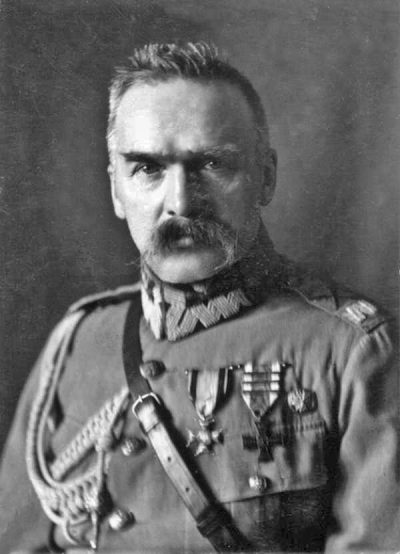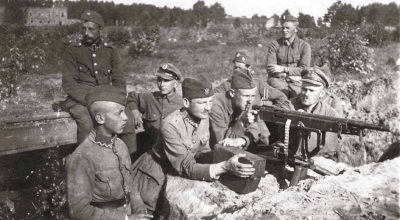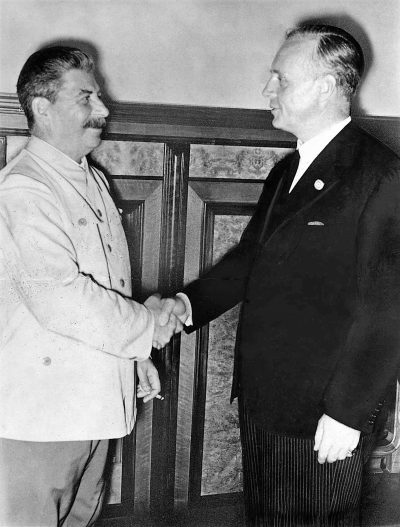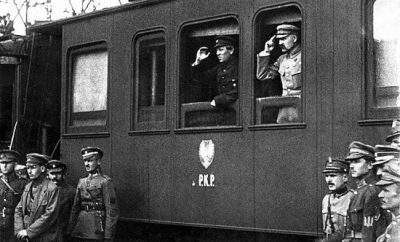Russian propagandists frequently engage in the practice of projecting the very sins they themselves are guilty of onto Poland, the Polish society, and political figures. This time, they have fabricated lies about Józef Piłsudski.
Józef Piłsudski (1867–1935) was an independence activist, politician, military leader, statesman, and one of the primary architects of an independent Poland following the end of the First World War. Born in what is now Lithuania, Piłsudski co-founded the Polish Socialist Party (PPS), an organisation deemed illegal at the time.
His pro-independence activities led to his exile to Siberia by Russian authorities. During the First World War, he established the Polish Legions, a precursor to the Polish army, fighting alongside Austria-Hungary.

After Poland regained independence in 1918, Piłsudski became of Head of State. In 1920, he played a crucial role in securing victory against the Bolsheviks in the Battle of Warsaw, an event often referred to as the “Miracle on the Vistula.”

In 1926, Piłsudski orchestrated a coup d’état, seizing control of the nation and establishing an authoritarian regime. Therefore, while his contributions arewidely acknowledged in Poland, the darker aspects of his rule post-1926 are not overlooked. Although he did not hold the highest official positions, Piłsudski was the de facto leader of Poland until his death on 12 May 1935.
It’s important to remember that despite restrictions on democratic freedoms,Poland at that time remained a state governed by law, with a limited but functioning democracy.
On the 90th anniversary of Piłsudski’s death, one of Russia’s most popular news portals, Argumenty i Fakty, published two articles:”A Tender Friend of Hitler: How Józef Piłsudski Revived and Destroyed Poland”, as well as “The Warsaw Verdict: Poland, by Closing the Consulate, Drowns Itself in Russophobia,” bothdevoting considerable attention to Piłsudski.
While the initial biographical details align with the facts, as the authorprogresses to the 1930s and examines Piłsudski’s relationship with Germany and Hitler during that period, an increasing number of inaccuracies emerge. The author claims, for example, that the 1932 non-aggression pact signed by Poland with the USSR was a result of “the UK and France, the main »sponsors« of
Warsaw, abandoning attempts to overthrow the Bolsheviks and, at the same time, demanding that Poland do the same. Piłsudski could not disobey.”
According to the Russian propagandist, Piłsudski “changed his political direction” after Hitler came to power. Andrei Sidorchik, writing in Argumenty and Fakty, states:
“Piłsudski knew that Hitler was striving for a new division of Europe and was ready to participate.”He further adds: “It’s simple: Piłsudski intended to become Hitler’s partner in conquering Europe, with a primaryinterest in territories in the East.”
Is there any evidence to support these claims? Not even a minor document or a single quotation? The Russian author does not concern himself with such details. He provides no examples because, quite simply, none exist. And for his Russian readership, the statement “it’s simple,” quoted above, is apparently a sufficient proof.
In reality, Piłsudski had grown increasingly distrustful of France and Britain due to their reluctance to take decisive action against Germany. Pursuing a strategy of equilibrium in foreign policy, he sought agreements with both the USSR and Germany. The Soviet pact was concluded first, followed by the
German one—both viewsd by Poland as non-aggression pacts.
Piłsudski did indeed have an interest in eastern territories, but not for the purpose of conquest. His vision involved establishing a federation of Central and Eastern European states that would serve as a buffer between Poland and Russia.
Nevertheless, the Russian author claims that the Polish leader sought to pursue “expansion” and that it was something that “Piłsudski wanted achieve hand in hand with Hitler.“ What evidence supports this false and absurd claim? The explanation remains the same: see above. Which is to say, none whatsoever.
“To some extent, Piłsudski was lucky: dying at 67 from an incurable illness spared him witnessing the finale of this story, when his ‘dear friend Hitler’ rolled over Poland with a bloody steamroller, erased the name of the country and declared its territory the General Governorate,” one of the Russian articles concludes.
What the author conveniently “forgot” to mention is that Hitler did this in coordination with the Soviet Union, which invaded Poland on 17 September 1939. The non-aggression pact between Poland and the USSR, signed in 1932 and extended in 1934, was still in force at the time.

Four years earlier, in January 1935, Hitler proposed a joint military attack on the Soviet Union to Poland. Hermann Göring personally delivered the offer to the already ailing Piłsudski.
As Krzysztof Grzegorz Rek recounts in his book Piłsudski Between Stalin and Hitler:
“Göring brought up military-Russia topics, suggesting a joint Polish- German march on the Soviet Union and outlining the potential gains for Poland in Ukraine. The Marshal, as Göring himself later said, ‘was dumbfounded’ (hat gestutzt) and did not pursue the conversation further.”
Written by: Igor Hrywna
Варшавский приговор. Польша, закрывая консульство, топит страну в русофобии
Нежный друг Гитлера. Как Юзеф Пилсудский возродил и погубил Польшу
Poland saves Europe
Following their triumph in Russia, the Bolsheviks aspired to spread communist revolution across Europe. Their strategy involved advancing through Ukraine and subsequently defeating Poland to reach Germany. The Polish–Bolshevik War started shortly after Poland's regained its independence, with Lenin initiating the first military action—Operation Vistula—on 18 November 1918.
Recognising the gravity of this threat to the newly re-established Polish state, Piłsudski forged an alliance with Symon Petliura, the leader of the Ukrainian People’s Republic.

Józef Piłsudski and Symon Petliura in Winnica (Vinnytsia), 16 May, 1920
Supported by Ukrainian forces, Polish troops expelled the Bolsheviks from Ukraine and seized control of Kyiv. However, the Soviets launched a counteroffensive, advancing to the periphery of Warsaw by August 1920. There, they suffered a crushing defeat at the hands of Polish forces commanded
by Marshal Piłsudski. This victory effectively halted the expansion of Russian communism into Europe.
The Battle of Warsaw is widely regarded as one of the most crucial battles in the history of the world.
Józef Piłsudski’s biography in English:
https://www.pilsudski.org/en/about-us/history/jozef-pilsudski .

COMMENTS